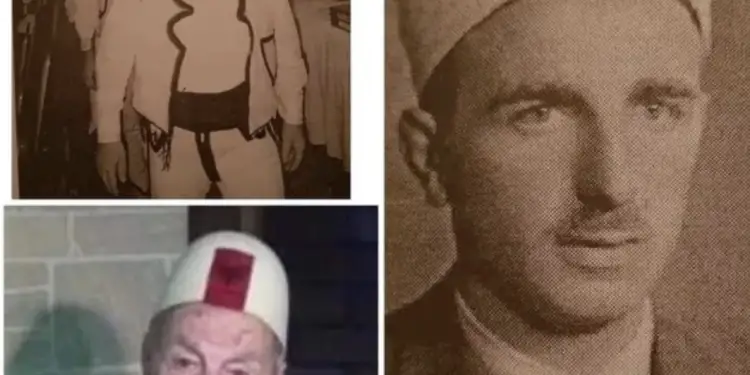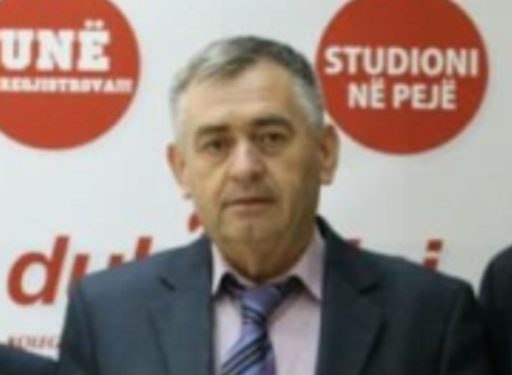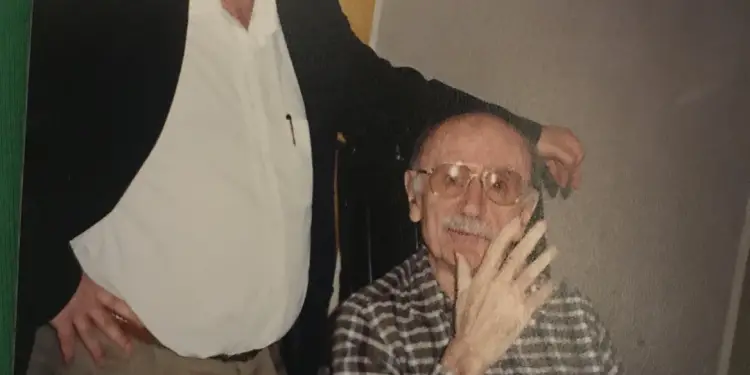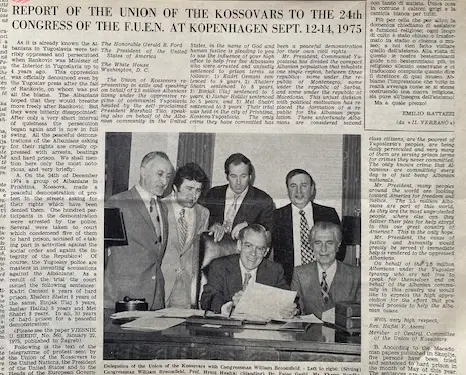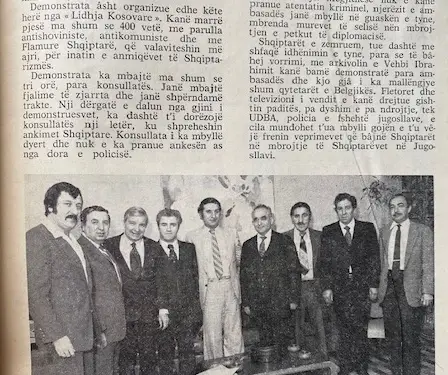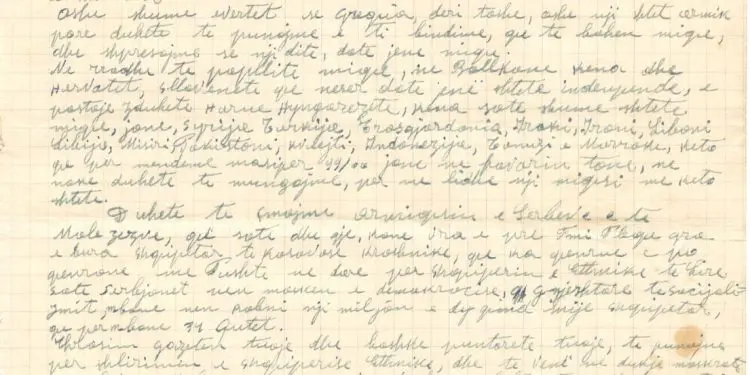By Elez Osmani
Part One
Jusuf Azemi: “If I had another life, I would still wage my fight for the nation and the Albanian people, for an Ethnic Albania”
Memorie.al / At the beginning of the year just passed, on February 12, 2023, at the age of 103, the oldest activist of the Albanian diaspora in America, Hafëz Jusuf Azemi, passed away. He was born in 1920, in the village of Dobrosht, Tetovo municipality. There he completed primary school in the Serbo-Croatian language, while in Tetovo he also attended high school, the madrasa (Islamic school), which he could not finish due to the start of World War II. He began hifz (memorizing the Quran) there and completed it in Damascus. Hafëz Jusuf Azemi, as a young man, was inspired by national feelings and publicly took the oath for the Balli Kombëtar (National Front) organization in the premises of the primary school in the village of Dobrosht.
The chronicles of the time state that Jusuf Azemi, even in his youth, had noticed the historical injustices against the Albanian people, starting from the time of the Kingdom of Serbs, Croats, and Slovenes (1918), then in Tito’s Yugoslavia, and finally, until the dissolution of that state in 1999, in the state of Serbia, which Albanians had never recognized as their own state.
Due to the difficult socio-political circumstances, following the arrival of the communist power in the ethnic Albanian space in former Yugoslavia, Hafëz Jusuf Azemi, with a group of Albanian youths, were forced to leave their homeland, taking the road to Greece. In the documents of the Yugoslav State Security (UDB), it is stated that Hafëz Jusufi deserted from the Yugoslav People’s Army.
Nevertheless, Hafëz Jusuf was forced to emigrate. However, in his narrative, he explains the terror that Albanians in Tetovo suffered upon the entry of the communists, during the cunning operation organized by the Slavs, in which a significant number of “Balli Kombëtar” sympathizers were killed, and a number of 650 people were imprisoned in the Tobacco Monopoly, among whom Hafëz Jusuf Azemi certainly was, along with 54 villagers from Dobrosht.
He managed to escape from that imprisonment, and after a terrible ordeal, he eventually reached Greece. From there he went to Bari, Italy, to then join the Albanian nationalists.
Hafëz Jusuf Azemi in Italy
After a week-long stay in Bari, they were sent to the tourist town of Santa Maria Di Leuca. In this town, they found Albanian nationalists, over a thousand people, led by the leaders of the “Balli Kombëtar,” headed by Mit’hat Frashëri, Vasil Andoni, Zef Pali, Hasan Dosti, and others, whose preoccupation was the fate of the Albanian people. In Italy, in the Reggio Emilia camp-shelter, Hafëz Jusuf Azemi met the chairman of the “Balli Kombëtar,” Mit’hat Frashëri, for the first time, whose ideas he had cherished for a long time.
As a young man, Jusuf Azemi was actively involved with a national spirit within the “Balli Kombëtar.” Seeing his commitment and determination, the Balli Kombëtar Congress, held in Reggio Emilia, Italy, engaged Jusuf Azemi to inform the members of the “Balli Kombëtar” from Kosovo about re-enlistment in the organization.
Jusuf Azemi, a young man from Tetovo, performed this task with great pleasure and commitment. In the memoirs of Jusuf Azemi, now in the light of national history, it is said that the meetings with the great man of the Albanian nation, Mit’hat Frashëri, remained unforgettable until the end of his life.
During Jusuf Azemi’s stay in Reggio Emilia, he had the fortune to briefly live in a room separated by a blanket from Mit’hat Frashëri. Then, at one point, he also met Shasivar Aliu, chairman of the Balli Kombëtar Youth of Prishtina, who lived outside the Reggio Emilia shelter, and who invited Hafëz Jusuf Azemi to dinner, along with Syrja Mexhiti from Tetovo and Mit’hat Frashëri.
This meeting of Jusuf with the aforementioned remained unforgettable for him. Hafëz Jusuf Azemi always recalled the meeting with Mit’hat Frashëri, and he wholeheartedly recited his orders, as they were thoughts spoken by the great man of the homeland, Mit’hat Frashëri: “The last words of Albanianism belong to Prishtina and Tetovo.” His compatriots in Chicago recall these words even today.
In these years, Jusuf Azemi also distinguished himself in the activity of the “Free Albania” Committee, especially after his proclamation as a representative in Paris on August 26, 1949. His commitment extended to cooperation with other political organizations whose activity had a national spirit.
When the formation of the “Free Albania” National Committee was announced in Paris in August 1949, headed by Mit’hat Frashëri, and when he held a press conference in London, he was reprimanded by some pro-Yugoslav British authorities, who objected to Frashëri’s words, which included “Kosova,” saying that he should only speak about those territories that were part of the current Albanian state.
Frashëri interrupted the conference. This outraged many patriots who did not like such a policy that marginalized Kosovo. Through their activity, they aimed for the formation of other Albanian organizations whose goal was to propagate and internationalize the unresolved Albanian issue.
Thus, in the context of the activity of the Albanian diaspora, the political organization “Lidhja Kosovare” (The Kosovar League) was formed in 1949 to represent Kosovo in the “Free World,” which Mit’hat Frashëri had initiated in April 1949. However, after his sudden death, the patriot Rexhep Mitrovica continued, structured, and realized this idea.
Initially, it was called the “Union of Kosovars.” The founding of this organization was of great importance because it later became a member of the Federal Union of European Ethnic Groups, where it presented the problems of Albanians in Yugoslavia. Later, it would change its name and be accepted as the “Kosovar League” in December 1956 in Bolzano, Italy.
Hafëz Jusuf Azemi in Syria
After staying in the Italian camp-shelters, in March 1948, the Italian authorities sent about 200 refugees to Damascus, Syria, including Hafëz Jusuf Azemi. In Damascus, Hafëz Jusuf enrolled in the Higher Madrasa of Sham. However, even there he did not cease his national activity, constantly contacting the heads of Albanian nationalism in exile. Thus, he came into contact with Vasil Gërmenji, who published the periodical “I mërguemi” (The Exile) in France from 1950-1954, and then the newspaper “Liri e Kombit” (Freedom of the Nation), in which he wrote articles and analyses against the communist system.
Among other things, he accused them of the wrong path they were following domestically, and of national treason regarding the fate of Kosovo, etc. Hafëz Jusuf Azemi maintained regular correspondence from Syria with this non-partisan personality. In a letter he wrote to the editor of the newspaper “I Mërguemi,” Vasil Gërmenji, which was found in Vasil’s archive (the author of these lines preserves its original), he congratulates him on his righteous work and aims, and also gives him his political suggestions. We are publishing the letter here for the first time.
Sh. Sh.
Sh. T
To the Editorial Office of the newspaper “I mërguemi”
Honorable Editor!
The branch of the “Balli Kombëtar” here in Syria received the newspaper sent this November. We thank you very much. Honest Albanians with free and democratic minds, hearts, and souls appreciate your honest and patriotic work and believe that we will do our patriotic duty, so as not to look first at the chair and then the homeland.
We must roll up our sleeves and work wholeheartedly, and distinguish patriots from the foreign opportunists, separate the sourness from the sweetness, once and for all, so that in the future, the Albanian People do not wash their feet.
We liked the newspaper very much, both in principle and in writing style. It is very true that Greece has been an enemy state until now, but we must work to convince them and hope that one day they will become friends. Among the peoples, we have friends in the Balkans: Croats, Slovenes, who will be democratic states tomorrow. Then, we must not forget the Hungarians.
But today we also have many friendly states such as: Syria, Turkey, Transjordan, Iraq, Iran, Lebanon, Libya, Egypt, Pakistan, Kuwait, Indonesia, Tunisia, and Morocco. The ones I mentioned above are 99% with our karar (decision/cause). We must not underestimate them, but forge a friendship with these states.
We must know (understand) the enmity of the Serbs and Montenegrins, who yesterday and today have killed and slaughtered Albanian children, old people, and men of heroic Kosovo, which has stood and is standing with a rifle in hand for a free Ethnic Albania. Today, Serbians, under the mask of a deceitful socialism democracy, keep one million and two hundred thousand inhabitants, comprising 34 cities.
We call on your newspaper and your collaborators to work for the liberation of Ethnic Albania, and to highlight the massacres of the Serbs and Montenegrins in Kosovo, to wage a fierce fight against these Serb bloodsuckers, as those who are outside and those inside have the same savagery, they have the same chauvinism.
We must know that in Yugoslavia we have friendly peoples who suffer like us. Who are they? They are the Croats, Slovenes, and a part of the Magyars.
Your beautiful organ (“I mërguemi”) was distributed regularly but was scarce. If you have the opportunity, send more in the next issues.
All free Albanians wholeheartedly thank you for your work. On behalf of this branch of the Balli Kombëtar, I sent you this short letter with few words.
Regards,
Hafëz Jusuf Azemi
Appreciating the commitment, effort, and expressed ideas of Hafëz Jusuf Azemi for the national issue, and his dignified determination, joining the well-known nationalist political figures who had left their countries, leaving their families, relatives, and the people in general in a terrible state of persecution, torture, executions, internments, and imprisonment. On the other hand, Vasil Gërmenji replied from Marseille, France:
Marseille, April 15, 1952
To Mr. Hafëz Jusuf Azemi
Poste Restante, DAMASCUS SYRIE
Honorable Mr. Azemi, we received your letter with the greatest pleasure, for which we thank you very much; we especially thank you for the sincere wishes you convey to us. It is the duty of all honorable and free Albanians to do everything possible for the good and the liberation of our unfortunate Homeland.
This is the reason that made us publish this leaflet to inform the Western World about what is happening in our Country and that the Albanian people suffer for little bread and much Freedom.
We are taking note to send you more copies of our newspaper so that as many compatriots as possible can read it. If you have the opportunity, give us the addresses of your friends who are interested in our newspaper and we will try to send it to them free of charge.
This newspaper is published with the sacrifices of a group of Albanian patriots without a party and fights for the liberation of the Homeland and for the Unification of all Albanians wherever they may be to achieve this goal. Those who can help us in any way (writings, information, material aid) make our work easier.
Many greetings and don’t forget us, writing to us whenever you have the opportunity.
Vasil Gërmenji
Hafëz Jusuf Azemi had now also come into contact with Abaz Ermenji, and his constructive and patriotic ideas had influenced and shaped the young man. He had experienced the terror of World War II in the Albanian territories, which fell from one rule to another. This did not leave him in peace. He sought paths and avenues from which he could continue his journey.
Hafëz was characterized by an unceasing fight and effort for the national cause, wherever he was. With the greatest desire, he had joined the ideas of Mit’hat Frashëri for Ethnic Albania, collaborating closely with the activists of the “Balli Kombëtar” and those of the “Kosovar League,” such as: Abaz Ermenji, Vasil Andoni, Luan Gashi, Qazim Prodani, Sylejman Meko, Hysni Aliko, Ekrem Bardha, Nexhat Mitrovica, Ajet Rushiti, Osman Shabani, Ismail Kashtanjeva, Ismail Shabani, and others.
They were aware that the Yugoslav UDB as well as the Albanian State Security was following their political and national activity. Precisely for this reason, they could not go to their homeland, where they had many family members. And Hafëz could not go to his beloved Tetovo for more than 50 years, where his wife and a daughter remained.
In the “UDB Secret File,” (p. 571), it is written: “Jusuf Azemi, born in the Tetovo district-Yugoslavia, about 30 years old. In 1947 he escaped…, and went to Greece, while in 1948 he immigrated to Italy, and that same year he immigrated to Syria. He has his wife and father in Tetovo. He is a member of the ‘Balli Kombëtar’. It is suspected that he works for the police, and goes for consultations in various countries. He lives in Teki, Damascus.”
Hafëz Jusuf Azemi had his aims and ideals for the solution of the national issue, regardless of the treatment given by European chancelleries. Thus, finally from Syria, he found the proper shelter in America, continuing his patriotic activity even more intensely.
The organization “Lidhja Kosovare” (The Kosovar League), whose headquarters were in Chicago, and which through its branches extended to New York, Detroit, Boston, Toronto, as well as in many other important European centers, such as Paris, Brussels, Copenhagen, Munich, Rome, etc., was led by distinguished patriots and activists of the Albanian cause, such as: Hafëz Jusuf Azemi, Prof. Luan Gashi, Ajet Rushiti, Bardhyl Shatku, Vasil Andoni, Ekrem Bardha, etc.
They, in one way or another, wanted the issue of Albanians in Yugoslavia to be actualized in the democratic world. And there are numerous writings, telegrams, letters, etc., that they sent to personalities, organizations, and various international centers. Here are some of them, published in the newspaper “Besa,” which was published in Istanbul.
BRAVO TO “LIDHJA KOSOVARE”
It is not only “Besa Shqiptare” that directs a bravo to the “Kosovar League,” but the entire Nation of the four vilayets, as it was called in the near past. It is known that after World War II, distinct nations everywhere were convinced that Lady Liberty, a divine creature for all humanity of the 5 continents, would reach their hearth. Unfortunately, no. Not only did the awaited Liberty not go to the hearth of many, but it clashed with wild force, and once again, it was stolen from a number of free nations, especially on the enlightened continent called Europe.
Faced with such disillusionment, it was an expected job that would revolt the Albanian population of Kosovo. It cannot deny the great heritage of its own race by becoming a servant of the Greater Serbs. “Lidhja Kosovare” demands freedom and life; it does not accept being a servant in its own hearth. It is Lady there and God in heaven.
Every year, the “Kosovar League” participates in congresses of European minorities for freedom and unification with its brothers. A special bravo should be allowed to be directed to the Honorable Hafëz Jusuf Azemi, for all that he does in America for Albanian Kosovo, as well as in every annual congress of European minorities, with the sweat of his honest labor. (Besa newspaper, organ of the Albanian Democratic Group in Turkey, March 1973, nr. 220)
Another title that catches the eye in this newspaper is:
Hafëz Jusuf Azemi in Washington
“The special committee for the inauguration of the second presidential term of President Nixon had invited the honorable Hafëz Jusuf Azemi, the representative of the ‘Kosovar League’ in America, from the Albanian circles, to participate in the customary ceremony. Hafëz Jusuf Azemi went to Washington, and as always, did not fail on this special occasion to discuss with Senators and Congressmen about the situation in Albania and also in Kosovo.” Memorie.al
Continues in the next issue




